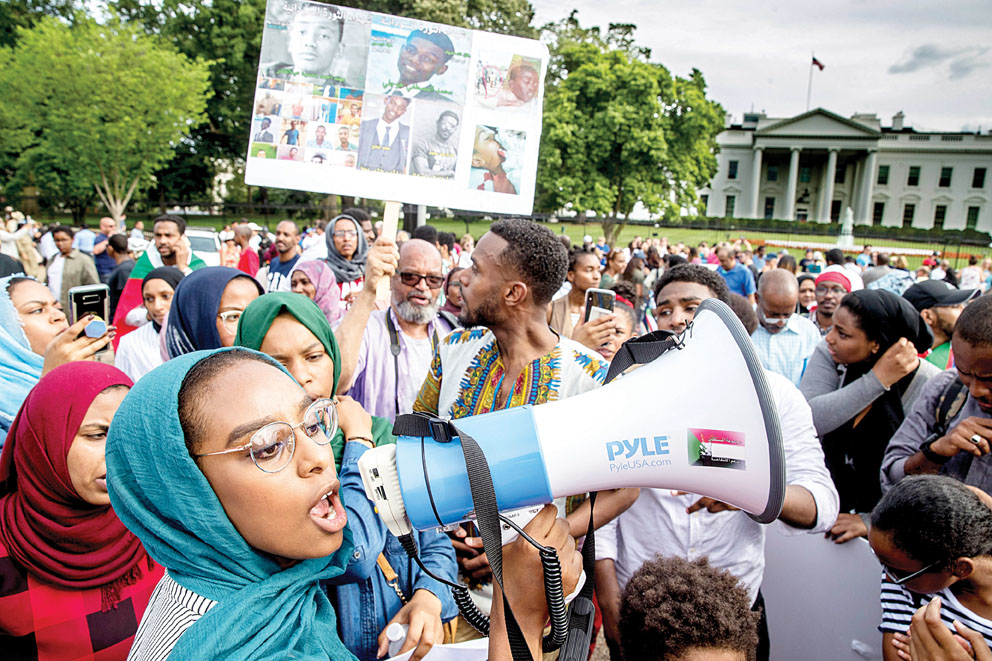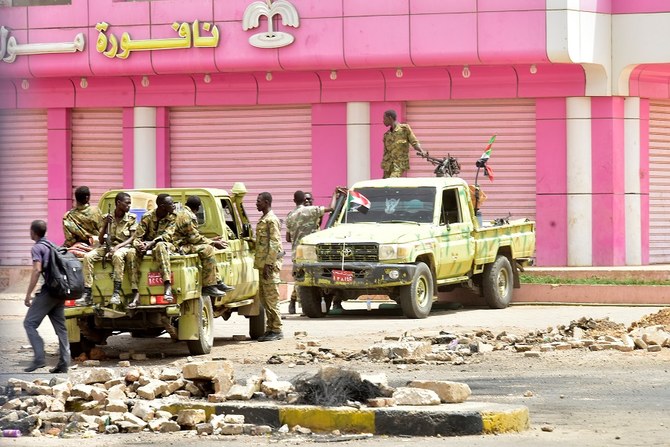KHARTOUM: Four people were killed in Sudan on Sunday as protesters launched a civil disobedience campaign against the military after a bloody crackdown on a sit-in demonstration calling for civilian rule.
The campaign got underway nearly a week after the assault on demonstrators at the sit-in outside army headquarters in central Khartoum, which followed talks breaking down between protest leaders and military rulers over who should lead a new governing body — a civilian or soldier.
Following the call for the campaign of civil disobedience, protesters set about building roadblocks in Khartoum while markets and shops were closed in several other towns and cities.
A doctors committee linked to the demonstrators said two people were killed on Sunday in unrest that rocked Khartoum and two others in its twin city of Omdurman, just across the Nile river.
The Central Committee for Sudanese Doctors blamed forces of the ruling military council and paramilitary “militias” for the four deaths, which it said took the overall toll to 118 since the June 3 crackdown to disperse the sit-in.

The health ministry says 61 people died nationwide in Monday’s crackdown, 49 of them by “live ammunition” in Khartoum.
In the capital’s northern Bahari district, people gathered tires, tree trunks and rocks to build new roadblocks as the campaign began Sunday.
“Almost all internal roads of Bahari have roadblocks. Protesters are even stopping residents from going to work,” a witness told AFP.
But riot police swiftly moved in, firing gunshots in the air and tear gas at demonstrators before clearing the makeshift barriers, he said.
The Sudanese Professionals Association, which first launched protests against longtime ruler Omar Al-Bashir in December, said the campaign of civil disobedience would continue until the military rulers transfer power to a civilian government.
In Bahari district, onlookers saw a police truck full of people in civilian clothing but it was not possible to confirm whether they were arrested demonstrators.
“We blocked the streets to send a message to those trying to steal our revolution that they will fail,” said Emad Ibrahim, 25, a protester from Bahari.
“It is a long road ahead for us, but after the sacrifice made by our brothers who have been killed, we believe that we will achieve our goal.”
Several protesters said they faced difficulties but were still backing the campaign.
“The roadblocks prevented me from reaching the market to buy vegetables,” said Hassan Abdelrahim, a vegetable vendor.
“This will impact my income, but when I look at these youngsters who are on the streets since six months, I’m not angry even if I lose my income.”
Khartoum residents have mostly remained indoors since Monday, when men in military fatigues raided the protest camp.
Several vehicles of the feared Rapid Support Forces, blamed by witnesses for the killings, were seen Sunday moving across some parts of the capital loaded with machine guns.
RSF members were also seen surrounding the main electricity station.

Sudanese Americans rally outside the White House in Washington in solidarity with protests in Sudan. (AP)
Several airlines have scrapped their Sudan flights since the deadly raid and passengers were left waiting outside Khartoum airport’s departures terminal Sunday, although it was unclear whether any flights would take off.
The downtown business district was largely shut and buses were not running in several areas, but private vehicles were ferrying passengers in some locations.
In Omdurman, many shops and markets remained closed but people were seen buying staples in some grocery stores.
“Troops were also seen removing roadblocks from some streets in Omdurman,” an onlooker said.
In the central city of Al-Obeid, the main market was shut and several bank employees did not report to work, residents said.
In the town of Madani, southeast of the capital, people were seen queueing outside closed bakeries while the main market was also shut.
“I went to three bakeries and have been unable to buy bread,” a Madani resident told AFP by telephone, adding that protesters had built roadblocks on several streets making it difficult for vehicles to pass.
It was the tripling of bread prices that first triggered protests against Bashir in December, which later turned into a nationwide movement against his ironfisted rule.
After the president was ousted in April, demonstrators remained camped out for weeks in Khartoum to pressure the ruling generals into transferring power.
After several rounds of negotiations between protest leaders and the military, talks broke down in mid-May.
Witnesses say the subsequent assault on the sit-in was led by the RSF, who have their origins in the notorious Janjaweed militia, accused of abuses in the Darfur conflict between 2003 and 2004.
Ethiopian Prime Minister Abiy Ahmed traveled to Sudan on Friday in a bid to revive negotiations, holding separate meetings with the two sides after which he called for a “quick” democratic transition.
























